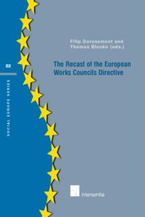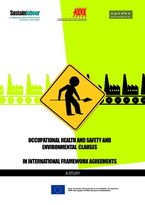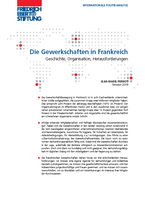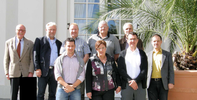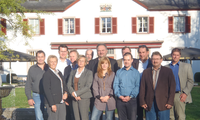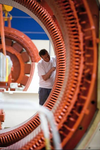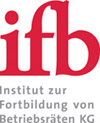 |
| Welcome to issue no. 3 / 2010 of EWC News. 31st October 2010
|
|
The
training and consultancy network
"euro-workscouncil.net"
EWC
News appears four times a year.
You can find past issues in the newsletter archives.
|
| 1.
European groups break US labour law
|
|
On 2nd September 2010 in New York, the human rights organization, Human Rights Watch, released a report on the violation of international labor standards by European companies operating in the USA. Amongst others are to be noted the mobile telephone operator T-Mobile (German Telekom subsidiary), the Parcel Service Company, DHL (German post office subsidiary), the Dutch Gamma Holding, as well as the French companies Saint Gobain, and Sodexo. They are being accused of highlighting their social responsibility in Europe and at the same time exploiting every possibility arising from US weak labour law. Intimidation and dismissal are in particular used as a means for preventing the establishment of employee representation. In July 2010, even the IKEA subsidiary, Swedwood, attracted attention by using similar harsh methods in the USA, after just having concluded an agreement with European representatives on the establishment of a European and World Work Council (see report in EWC News 2/2010). In Deutsche Telekom the German ver.di trade union supports US employees to obtain trade-union representation:
At DHL world-wide respect is also demanded:
The latest draft of the Employee Free Choice Act (EFCA) has been up before US Congress since 10th March 2009. The law is to facilitate recognition of trade unions as bargaining partners for shop floor collective agreements, if a majority of employees agree to undersign the request. The law provides for binding conciliation where no agreement is reached after 120 days and increases penalties for companies which discriminate against employees for union activity. It is at present uncertain as to whether the bill will find a majority. Should the legislation, supported by President Barack Obama, be passed, then the USA would have a better legal situation than the UK.
The largest trade union of the British Isles, Unite, has merged with the largest North American private sector trade union, USW. Trade unions from further countries are invited to join the new organization "Workers Uniting". At present it has three million members in the United Kingdom, the Republic of Ireland, USA, Canada and in the Caribbean. The British trade union Unite was founded in May 2007 through the merger of two cross-industry trade unions (see report in EWC News 2/2007). |
| 2.
Union Busting in Europe
|
| Great Britain: Playing ground for trade union busters
Since there are neither employee co-determination rights nor works councils in the United Kingdom, the recognition of trade unions as bargaining partners for shop-floor collective agreements is the only possibility for establishing adequate employee representation. Similarly to the USA, special advisors (so-called labor relations specialists but better known as trade-union busters) are therefore put in place in the United Kingdom, in order to intimidate employees and so prevent the establishment of employee representation. In the case of the Kettle Chips food manufacturer this led to country-wide, intense protests in 2007 in the media (see report in EWC News 3/2007).
German companies also exploit weak British labor law
A first precedent in the history of British labor law was set in July 2007, not for a native company, but for the German publishing house Holtzbrinck: for the first time an enterprise was fined for violation of minimum standards for the respect of employee representation (see report in EWC News 2/2007).
According to investigations from the European Trade Union Institute in Brussels no other country in Western Europe registers a lower level of employee participation than the United Kingdom. Within the European Union employee representation is less pronounced only in Bulgaria and the three Baltic states (see report in EWC News 2/2009). Work councils are still considered alien in the Anglo-Saxon trade union and business cultures. Employee representatives and EWC members have an opportunity to familiarize themselves with the current situation of employee representation in the United Kingdom after the change in government, in the EWC specialist seminar taking place on 25th January 2011 in Hamburg, Germany. English language interpretation will be provided.
Romania: Nokia wanted to keep trade unions away
As a reaction to the activities of Cartel-ALFA, Nokia management promoted the establishment of an employer-friendly in-house union. To be recognized as bargaining partners Romanian trade unions have to prove their representativeness. This is most easily done by affiliation to a large umbrella organization. The employer-friendly union in Nokia therefore joined the CNSLR-Frăţia ex-communist confederation. At present there are 1,500 permanent employees in Jucu with a further 2,300 temporary workers. Now each union has one delegate appointed to the Nokia Euroforum (the name given to the EWC established in 1993). There are now concerns in the workforce that future relocation will have a negative impact on Jucu.
|
| 3. Further
notes from individual countries
|
|
On 22nd September 2010 the British trade union Unite signed a national collective agreement with Sun Chemical, covering all of its’ 16 British sites and employee categories. The US enterprise is the world largest manufacturer of printer ink. The agreement can be considered as a milestone in United Kingdom’s extremely decentralized bargaining landscape. Normally collective agreements are usually signed for individual employee categories within a company or for individual sites. The national collective agreement replaces all agreements signed previously on a local level. Sun Chemical does not yet have a European Work Council.
Participation rights under discussion in Switzerland
In 2007, the Unia trade union made a comparison between Swiss employee participation rights and EU standards. The documents are only available in German and can be downloaded here:
After the failure to sell Opel to the automobile supplier Magna (see report in EWC News 3/2009), the central management of General Motors announced in January 2010 the closure of its plant in Antwerp. On 27th April 2010 in co-operation with the European Work Council a transition agreement was reached. Over half of the 2,600 employees have since left with early retirement or severance packages. Employees receive up to 144.000 € compensation.
The transition plan also contained future production gaurantees for a possible investor, with a view to keeping the plant open. Despite the continued efforts of the European Works Council, the last potential investor abandoned on 18th October 2010. Production will therefore definitively stop on 31st December 2010. |
| 4. New EWC Directive - events
|
|
On 1st September 2010 a EWC conference took place in the Slovenian capital in the scope of the "EWC Networking" project, sponsored by the European Union, with participants from Austria, Italy, Slovenia and Croatia. Main speakers were the Secretary-General of the European Trade Union Confederation in Brussels, John Monks (photo), the former member of the European Parliament, Jan Cremers from the Netherlands and Dr. Werner Altmeyer from the training and consultancy network "euro-workscouncil.net" in Hamburg, Germany.
Romanian EWC seminar in Sibiu
Exchange of experience in the insurance industry
Employee representatives from the Allianz, Axa, Ergo, Generali and Zurich companies from nine countries met together on 28th and 29th October 2010 in the ver.di union federal headquarters building in Berlin (photo), for an exchange on working practice and to identify necessary adjustments of their agreements to the new EWC Directive standards.
Evelyne Pichot from the European Commission in Brussels described the details of the new legal situation and Dr. Sebastian Hopfner from the European Employers' federation of the insurance sector discussed possible common initiatives in the context of social dialogue. The meeting was organized by the training and consultancy network "euro-workscouncil.net" and will take place regularly. This was the first time ever that such a meeting had taken place for the insurance industry. |
|
5. New EWC legislation starts
to take form |
| Germany: Chemical industry anticipates EWC legislation
After the change of government in London it was at first unclear whether or not the EWC legislation prepared by the Labour government and passed in parliament on the 6th April 2010 would be upheld (see report in EWC News 1/2010). It is now however certain that it will come into force unmodified on the 5th June 2011. The law copies, word for word, large parts of the new EWC Directive. The responsible Ministry is headed by the liberal democrat and former Labour politician, Vince Cable (see report in EWC News 2/2010). Likewise the new time-off regulations for EWC and SNB members, which already came into force at the beginning of 2010 remain unchanged (see report in EWC News 3/2009).
Transposition on the home stretch for many more countries
Following on from Portugal which, already in November 2009, was the first country to transpose the new EWC Directive (see report in EWC News 4/2009), most other countries have in the meantime well advanced with the preparations. In Sweden there was a public hearing on the subject, in Belgium the appropriate collective agreement is nearly finished and in Slovakia a draft bill was recently published by the Ministry of Labour. In Hungary a more extensive reform of the labour code is pending anyway before the end of the year. Delays are expected in Italy, where the old 1994 EWC Directive was only transposed in 2002, after the European Commission had threatened to bring the Italian government before the European Court of Justice
Coordinating role of the European Commission
The head of departments from the ministries of the European Union countries have met five times in Brussels over the past months in order to co-ordinate the refinement of the transposition laws with the European commission. Further meetings are planned. The European Commission is currently working on a document, which examines in more detail the question of national transposition. It is to be published on the turn of the year 2010/11 in Brussels.
|
| 6. New
European Work Councils |
|
The joint venture created in April 2007 by Siemens and Nokia for mobile and fixed network infrastructure products has a European works council in place under Finnish law since end of June 2010. Since NSN underwent extensive restructuring following its creation, the European Metalworkers' Federation (EMF) had already created a co-ordination committee in May 2007 which functioned as a replacement for the not yet created EWC (see report in EWC News 2/2007).
The new EWC is made up of 27 members from 25 countries with 2 representatives each from Germany and Finland. The special negotiating body (SNB) decided, after expiration of the three-year negotiation period, to create the EWC according to the subsidiary requirements without conclusion of a EWC agreement. The standards of the new EWC Directive therefore apply automatically to Nokia Siemens Networks starting from 5th June 2011.
In a common recommendation, European trade union federations warned in December 2009 against concluding EWC agreements between June 2009 and June 2011 below the standards of the new Directive. Agreements, which are signed during this transition period, generally fall outside the legal scope of the new Directive.
British supermarket chain establishes EWC under old Directive
Four EWC members from different countries and a full-time representative of the British retail trade union USDAW form a "Working Group", which meets twice annually. There is a provision for one plenary meeting per year. The agreement is still based to a large extent on the old Directive. The global Tesco trade union network created in June 2008 (see report in EWC News 1/2010) has already requested the extension of the social dialogue beyond Europe. Tesco has 450,000 employees world-wide.
Lukoil wishes to create a European works council, with higher standards of information and consultation than in the European Union. The CEO announced this on 13th October 2010 to the European Trade Union Confederation (ETUC) in Brussels. Lukoil operates refineries in Bulgaria and Romania and holds minority participations in Italy and the Netherlands. |
| 7. Transnational
collective agreements
|
| European-wide Charter aims at reducing occupational stress
The PPR agreement had been under discussion between the steering committee of the European works council and management for eight months. It was particularly difficult to find a common definition of stress. The agreement will be monitored every two years in the EWC plenary session.
The aeronautics and spaceflight corporation EADS concluded a framework agreement for transnational negotiations on 28th September 2010. For this purpose a separate body will be created in parallel with the European works council. One seat is allocated per 10,000 employees with an upper limit of five per country. Whereas these seats will be occupied by trade unions in France, Spain and the UK, the national group works council has the mandate in Germany. It may also send external trade union officers, if these were designated beforehand as permanent experts by the EWC.
Both EWC chairmen belong automatically to the negotiation body, which is coordinated by the European Metalworkers' Federation (EMF). A two thirds majority of the delegates must be reached before an agreement can be signed with central management. Similar rules apply to negotiations on the individual business branch level (e.g. in Airbus).
Who should negotiate: works council or trade unions?
Lack of legal framework, lack of staff resources
For these reasons over the last years union coordination bodies have been formed in large companies of the metal industry in parallel to the EWC and who can play a stronger role in restructuring. There is however no legal basis for these bodies, their role is defined - as is the case with EADS - by company agreements. Another prominent example is given by the steel group ArcelorMittal in November 2009 (see report in EWC News 4/2009).
A strong coordination role for a European trade union federation requires however sufficient full-time staff in the administration. Where this is not present, negotiations are carried out by the European works councils themselves (see examples in EWC News 2/2009). Otherwise nothing may happen, such as in the French pharmaceutical company Sanofi-Aventis: where central management itself announced, in April 2007, that it was ready to negotiate transnational agreements with the EWC on occupational training, the social effects of restructuring and integration from severely handicapped employees (see report in EWC News 1/2007). The negotiations however have never started, since it is still unclear as to whether they should be handled by the EWC or by the European Mine Chemical and Energy Federation (EMCEF). Criticism was clear to hear on the sidelines of the Sanofi-Aventis plenary EWC meeting in June 2010 in Berlin (see report in EWC News 2/2010).
|
|
8. SE
Directive versus merger Directive |
| Ship and energy supervisory group concludes outstanding SE agreement
SE works council with three level structure
As in many other SE agreements the number of works council members has been reduced. The SE works council consists of nine members, four from Germany, two from the United Kingdom and three regional representatives for the remaining countries. Of particular interest are the annual regional meetings. National employee representatives from all countries, who are not directly represented in the SE works council, participate in these meetings. The SE works council meets twice annually and selects a three member steering committee. The agreement provides a special protection for countries with small workforce. There had not yet been a European works council in the GL group.
Unlike the testing and assessment company Dekra in Stuttgart, which signed an SE agreement with a parity-based supervisory board in June 2010 (see report in EWC News 2/2010), the GL group has frozen employee participation in the supervisory board to one third. In Germany the group employs a little fewer than 2,000 employees, and world-wide around 7.000. The GL group therefore joins the large queue of family-run businesses, which use the SE transformation as a means of avoiding parity-based supervisory board codetermination (see report in EWC News 2/2008).
New boss and reduced supervisory board at Bilfinger Berger
The negotiations for the SE participation agreement were led by a 28 member SNB of which six from Germany and two from Poland. They represented 48,000 employees in 22 European countries. The European works council which has been in place since 1996 will now be replaced by a SE works council. Hessen’s former Prime Minister Roland Koch (CDU) will be the new CEO of the SE.
Food manufacturer: Merger instead of SE
On 18th February 2010 the German manufacturer of ready meals, Apetito, merged with its Dutch subsidiary. The family-run business based in Rheine has 1,978 employees in Germany and would have soon had to establish a parity-based supervisory board without the merger. The group has 8,400 employees world-wide.
On 27th January 2010 the special negotiation body (SNB) was established in Rheine, with five representatives from Germany, four from the United Kingdom and two each from France and the Netherlands. On the very same day the SNB members signed the agreement which had been drafted by management according to which both employee representatives on the supervisory board remain German and are elected by the German works councils. The new supervisory board met on 29th April 2010 for the first time.
Apetito is the second company in Europe, to have concluded a participation agreement on the basis of the EU Merger Directive (see report in EWC News 2/2009). Unlike the SE transformation, the SNB negotiates only on the supervisory board and the establishment of a transnational works council is not in the scope of the negotiations. In order to fill this gap, the Apetito works council participated in a seminar organized by the training and consultancy network "euro-workscouncil.net" in Bonn from 15th to 17th September 2010 and covering the different possibilities offered by the EWC Directive.
Current figures on SE legal structures
On 1st September 2010 the Hans Böckler Foundation released current figures on the SE. According to the report, half of all SE companies in operation reside in Germany (78 out of 157). One reason for this: the SE enables the limitation of employee participation at the highest company level by either freezing the number of seats in the supervisory board to one-third or by reducing the number of seats in a parity-based supervisory board. The following texts are available only in German: |
|
9. The view beyond the
European
Union |
Indonesian company commits itself to social responsibility
Ford EWC members visit Russia From 4th to 7th October 2010 a delegation of Ford’s European works council visited a factory in the proximity of Saint Petersburg. Amongst other topics they discussed the creation of a local employee representation. One representative from Russia currently participates as an observer in the European works council meetings which are held four times per year. Initiatives taken by the Volkswagen EWC in September 2009 had already led to the establishment of a works council in a new Russian factory (see report in EWC News 4/2009). U.S. paper manufacturer institutionalizes world-wide employee representation
The agreement signed now provides for an annual meeting between the KC network and company management. In all 116 factories around the globe "Points of Contact" will be put in place between the respective management and employee representatives. In actual fact this does not only mean the establishment of a form of world works council, but also recognition for local representatives for the over 58,000 employees in 35 countries. The agreement resembles the Charter for industrial relations signed at Volkswagen in October 2009 (see report in EWC News 4/2009). |
| Central European Trade Union Academy (MEGAk)
The German employees of the Metro retail group are confronted by the project CORA which threatens to relocate the billing and accounting to Eastern Europe and India. They have created a website dedicated to an exchange of information and discussions on the topic.
Review of employee participation in five countries
Trade union network in the cocoa and chocolate industry
We have arranged various further interesting web-pages into a collection of links.
|
| 11. New
publications |
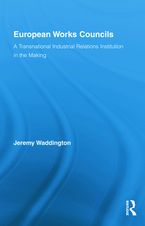
On 29th July 2010 a book from Jeremy Waddington, a EWC researcher from Manchester University was published. In 2005, as a project manager at the European Trade Union Institute in Brussels, he was responsible for the largest ever accomplished empirical analysis on European works councils. The book is based on this extensive numerical data. At the time the quality of information and consultation on restructuring was very poor under the old EWC Directive. The author highlights the infrastructure of the European works councils (means, training etc.) and the role of unions. A separate chapter is dedicated to the development beyond information and consultation to transnational negotiation. The author is critical of the fact that such a reinforcement of the EWC role is not only rejected on the employer’s side, but also by the trade unions (see report further above).
Following the first legal commentary on the new EWC Directive already published in May 2010, (see report in EWC News 2/2010), a new volume on important legal aspects of the EWC legislation has now been released. In the first part of the book an analysis is made between old and new EWC Directives in the context of court decisions and other EU rulings. It finishes off with country reports from Austria, Belgium, France, Germany, the Netherlands, Slovakia, Sweden and the United Kingdom. In the second part of the book several authors deal with special aspects of the new legal situation.
In July 2010, results of a research project were published which covers aspects of sustainable development as part of international framework agreements. Both European works councils and unions increasingly negotiate such agreements on the level of multinational companies, with a view to guaranteeing minimum social standards around the globe. The analysis examines 72 of these framework agreements, from which 49 contain already special provisions on occupational health and safety. A prominent and recent example given is the steel group ArcelorMittal (see report in EWC News 1/2010). The analysis finishes with four case studies from companies in different industries and is available in English, French and Spanish.
On 19th October 2010, the Paris branch of the Friedrich Ebert Foundation released an analysis of the French trade union movement. Although only eight per cent of the workforce are trade union members, another three confederations have been created in the last years as spin-offs of the already 5 representative confederations. However the labour law, revised on 1st January 2009, forces the competing confederations to co-operate. Above all small organizations can only survive by forming alliances, which represents a radical change with the French post-war development (see report in EWC News 1/2010). The new legal situation was challenged in court, but has since been confirmed, in April 2010, by the highest French Court of Appeal in a landmark ruling (see report in EWC News 2/2010).
|
| 12. Training and Consultancy
Network "euro-workscouncil.net":
Further examples
of our work |
|
First workshop for SE works councils
The SE workshop was organized for the first time by the training and consultancy network "euro-workscouncil.net" and will be run again in 2011. Since the number of SE works councils is still relatively small, the next date will be coordinated with any interested participants by telephone. A questionnaire is available for download for this purpose. Following texts are available only in German:
Once again the training and consultancy network "euro-workscouncil.net" organized a seminar from 11th to 13th October 2010, for European works council members, wishing to adapt their EWC agreements to the standards of the new Directive. Participants from special chemicals industry, the pharmaceuticals, the food industry, mechanical engineering and from the telecom sector came together in Auel Castle near Cologne (photo). The event is offered once per year and was run for the first time last year (see report in EWC News 3/2009).
The European works council of the French electrical engineering company, Converteam, participated in a one week training held from 18th to 22nd October 2010 in Berlin and organized by the training and consultancy network "euro-workscouncil.net". The training focused on globalization, assessment of business data as well as a comparison of the EWC agreement with the new Directive. The company was sold in 2005 by the Alstom group to a British financial investor and created its own EWC in 2007 (see report in EWC News 2/2007).
Since September 2009 the north Bavarian metal processing company Warema is operating as a European Company (SE). Following the election of the supervisory board and the very first election of the European works council in June 2010 (see report in EWC News 2/2010) the training and consultancy network "euro-workscouncil.net" held a starter-training on 20th and 21st October 2010 at the company headquarters in Marktheidenfeld (photo). Focus was on the role and powers of the new body and co-operation with the employee representatives on the European level supervisory board of the SE. |
|
13. Current
Seminar Schedule |
At present, registrations are possible for the following seminars and workshops:
Hamburg Conference for European Works Councils
24.01.2011 in Hamburg Employee representation in the United Kingdom after change in governement 25.01.2011 in Hamburg (both dates may be booked separately, English interpreters available)
English language course for works council members 24. – 27.01.2011 in Hamburg 19. – 25.06.2011 in Eastbourne (England)
Seminars of the Institute for Further Education of Works Councils (ifb)
Basic seminar: The path to the European Works Council 11. – 15.04.2011 in Berlin 07. – 11.11.2011 in Munich
Advanced seminar: Practical knowledge, EWC special 15. – 19.11.2010 in Hamburg 02. – 06.05.2011 in Cologne 21. – 25.11.2011 in Stuttgart
In 2011 the training and consultancy network "euro-workscouncil.net" will be organising another SE workshop. Since the number of SE works councils is still relatively small, the next date will be coordinated with any interested participants by telephone. Anybody interested should please fill in and return the following questionnaire.
In-house events Please find a survey of possible subjects of in-house events here: |
| 14. Imprint
|
EWC
News is published by: Training
and consultancy network "euro-betriebsrat.de" GbR Von-der-Tann-Straße
4, D-20259 Hamburg www.euro-workscouncil.net (English) www.euro-ce.org
(French) Authors
collaborating on this
issue: Werner Altmeyer, Sandro Maier, Rudolf Reitter,
Bernhard Stelzl Distributor
of the German
version: 14,106 readers Distributor of
the English version: 1,904 readers Distributor of
the French version: 1,875 readers Newsletter
archive: www.ewc-news.com
We are always pleased to
receive comments and suggestions in relation to this newsletter as well
as reports on your EWC activities. Please write us at: info@euro-workscouncil.net
www.euro-betriebsrat.de (German)

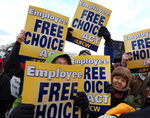




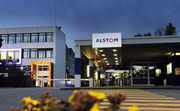

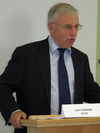
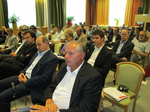
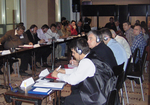

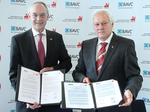



 EWC for the largest Russian oil company
EWC for the largest Russian oil company
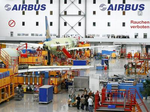

 These current examples highlight the different
strategies which are to be observed with the development of European
works councils. The right to negotiate or even codetermination rights
for European works councils is rejected by the European Metalworkers'
Federation (EMF). It aims at two separate roles as in French industrial
relations: the works council is responsible for information and
consultation, while negotiation remains the privilege of the trade
unions. The EMF has particularly learned from the experiences with
General Motors and decided in June 2005 on the appropriate principles
for handling company restructuring.
These current examples highlight the different
strategies which are to be observed with the development of European
works councils. The right to negotiate or even codetermination rights
for European works councils is rejected by the European Metalworkers'
Federation (EMF). It aims at two separate roles as in French industrial
relations: the works council is responsible for information and
consultation, while negotiation remains the privilege of the trade
unions. The EMF has particularly learned from the experiences with
General Motors and decided in June 2005 on the appropriate principles
for handling company restructuring.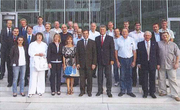
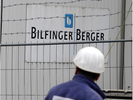


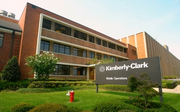
 In January 2010 diplomas were
attributed from the MEGAk for the first time in the context of the
international train-the-trainers program between Austria and Slovakia.
More detailed information on the activities of MEGAk is available on
the following web site:
In January 2010 diplomas were
attributed from the MEGAk for the first time in the context of the
international train-the-trainers program between Austria and Slovakia.
More detailed information on the activities of MEGAk is available on
the following web site: 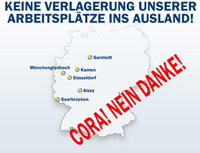
 The Informia project, sponsored by the European
Union, deals with the social dialogue at a company level and European
works councils in five countries: Italy, France, Ireland, Bulgaria and
Croatia. Part of the project is an empirical analysis of current
working practice for employee information and consultation in these
five countries.
The Informia project, sponsored by the European
Union, deals with the social dialogue at a company level and European
works councils in five countries: Italy, France, Ireland, Bulgaria and
Croatia. Part of the project is an empirical analysis of current
working practice for employee information and consultation in these
five countries.
